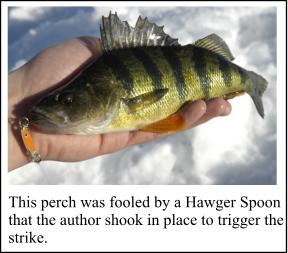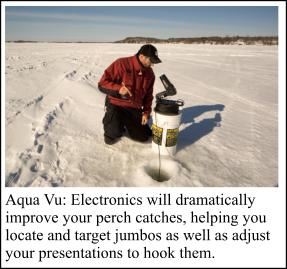|
Ice
Fishing Perch Pointers
By Tim Allard
 Targeting
perch through the ice is one of my favourite types of hard-water
action. Not only are perch relatively easy to catch and often eager
to bite, they are one of the best tasting freshwater fish. To help
boost your perch fishing results this ice season, here are some tips
to put more jumbos on the ice. Targeting
perch through the ice is one of my favourite types of hard-water
action. Not only are perch relatively easy to catch and often eager
to bite, they are one of the best tasting freshwater fish. To help
boost your perch fishing results this ice season, here are some tips
to put more jumbos on the ice.
Cash-In on the
Competitive Nature of Perch
Using an underwater camera, I've lost count of how many times
I've seen a pod of perch move in on a bait in unison. After their
initial approach, it rarely takes long for one to jump on the bait
before the others. Yes, perch are a competitive breed and as an
angler you should use this to your advantage. One way is to fish
close to other anglers to keep perch schools in close proximity,
generating a bit of competition towards your lures. This also
includes fishing your two lines close together, whether dually
jigging holes or setting up a dead-stick rod and a small minnow
within reaching distance.
It's also important to
ensure you're working baits with seductive triggering tactics after
you attract perch. I favour either slowly swimming a bait upwards or
lightly shaking it in place. Both send out signals of vulnerability
or an impending attempt at escape. Lastly, don't forget to tip your
baits with minnows, maggots, or highly-scented artificial baits.
Flavour helps to trigger hits.
 Use
Electronics Use
Electronics
Underwater cameras and flasher units can make a big difference
in the number and size of perch you catch in a day. Use these two
units in tandem and you've got deadly combination.
I can recall marking
several aggressive fish on my Vexilar during an outing several years
ago. I knew this lake had a huge perch population, so I was eager to
hook some. After several minutes with no success, even though the
fish I marked seemed aggressive, I lowered my underwater camera.
Below were dozens of tiny perch. Now when I see this pattern, I know
I need to move to deeper water to find the jumbos.
The benefit to this
learning is two-fold, now I know what areas to vacate when searching
for big perch based on details from my Vexilar; however, when I spot
these small sized perch schools near points or deep water breaks I
take note and return to them at dusk. Walleye will often target
these pint-sized perch at dusk and being on these areas before
sunset can result in some hot action.
You can also use
underwater cameras to selectively hook the larger perch in a school
if you're after jumbos for the frying pan. Sometimes smaller fish
are the first to get to the bait. If you pull the lure away from
them and position it towards a jumbo you can sometimes get the
bigger ones to bite. Lastly, electronics provide you with great
feedback on how fish are reacting to your presentation. This allows
you to modify your jigging moves to match their disposition and
experiment with tactics until you find the right combination to
trigger hits.
Get on Prime
Structure
I alluded to it above, but ensuring you're on prime structure
and the most productive jumbo perch spots will result in better
catches. This often equates to moving away from shallow water and to
deeper areas. On most lakes I fish, I tend to find jumbos in
anywhere from 12 to 30 feet of water and often suspended at various
depths in the water column. Reefs, long points, and deep water
inlets that lead into shallow bays, are all prime areas to search
for wintertime perch. Using hydrographic maps or pre-scouting areas
in the fall with a GPS unit are two great ways to locate these
structures so you can fish them come winter.
Keep these methods in
mind on your next perch ice fishing outing. You'll put more jumbos
on the ice and have a few more for the frying pan at home.
Photos
by Tim Allard
|